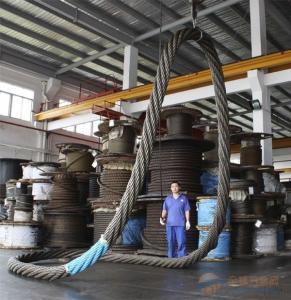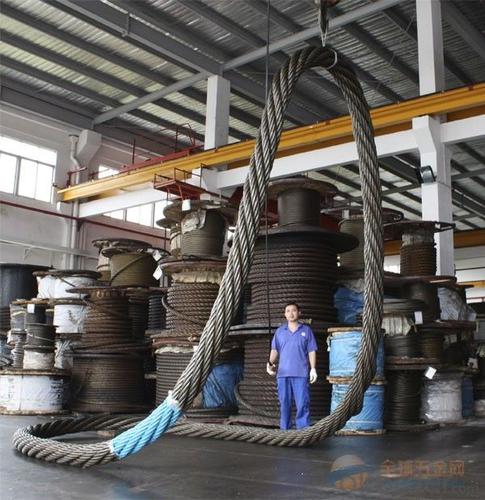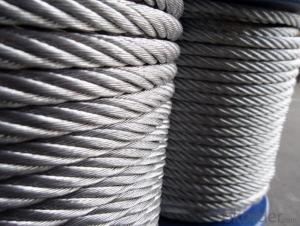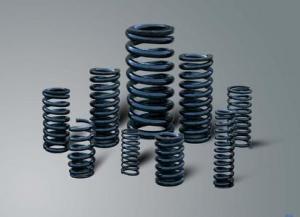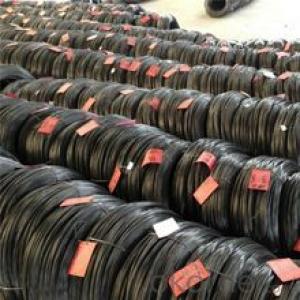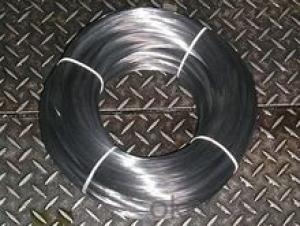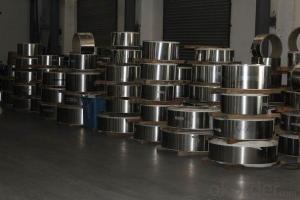Stainless Steel Spring Wire For Crane Hot Sale and High Quality
- Loading Port:
- Shanghai
- Payment Terms:
- TT OR LC
- Min Order Qty:
- 8000 kg
- Supply Capability:
- 10000 kg/month
OKorder Service Pledge
OKorder Financial Service
You Might Also Like
1.Packing And Delivery
Package: Seaworthy package
MOQ: 0.5 tons
Delivery: 15-20 days
Monthly Output: 100 tons
Payment : 30%T/T in advanced+70% balanced;irrevocable L/C at sight
Remarks: All-risk insurance and accept the third party test
Port : Shanghai
AISI 316 high tensile strength stainless steel spring wire
| Detail as follows: | |
| Standard | AISI,ASTM,GB,SUS etc |
| Grade | 201,202,204,301,303,304,304L,310,316,316L etc |
| Diameter | 0.7mm-14.0mm |
| Surface | Bright or matt |
| Condition | hard |
| Tolerance | +/-0.03mm |
| Length | According to customers’ requirement |
| Packing | Packed by weaved bag or according to customer's requirements |
| Technology | Cold drawn |
| Application | Spring |
| Productivity | 300 tons/month |
| MOQ | 100KG |
| Note | We can produce other standard as the customers' requirement |
ODM&OEM SERVICES | |
Service | Drawings or samples processing/OEM/ODM service provided |
Produce Process | Drawings→ mould making → pre-forging →rough machining or finish machining →surface treatment →product checking and quality control→ packing →delivery |
Forging Material | Carbon Steel, Alloy steel, Stainless steel |
Standard | ISO, GB, ASTM, DIN, JIS |
Produce Equipment | Friction Screw Press Series, CNC Lathe, Machining Center (Vertical Spindles), CNC Milling Machine, Bench Drilling Machine, Heat Treatment Equipments and so on. |
Surface treatment | Heat treatment, Polishing, shot blasting, Painting, Electro-plating, Chemical Plating, |
Inspection Equipments | Metallurgical analysis, tensile strength tester, Hardness tester, Altimeter, Scale Micrometer, pressure tester, etc. |
Delivery | Samples are sent by express Large quantity products delivered to customer by sea or according to your request |
Terms of payment | T/T or L/C |
1. Competitive price and quality from our own factory
2. Approved by ISO9001, CE, SGS every year
3. Best service with 24 hour`s reply
4. Flexible payment with T/T,L/C , paypal, kunlun bank, western union, etc.
5. Smooth production ability(50000tons/month)
6. Quick delivery and standard exporting package
7. OEM/ODM
- Q: What is the role of steel pipes in the mining and extraction of minerals?
- Steel pipes play a critical role in the mining and extraction of minerals as they are used for various applications throughout the process. These durable pipes are commonly employed to transport and distribute water, chemicals, and compressed air to different areas of the mine. Additionally, steel pipes are utilized in the construction of mine shafts, tunnels, and underground structures, providing stability and support. Their ability to withstand harsh conditions, resistance to corrosion, and high strength make steel pipes an indispensable component in the mining industry.
- Q: What is the difference between steel pipes and PVC-O pipes?
- Steel pipes and PVC-O pipes differ in their material composition, strength, durability, and installation process. Steel pipes are made of steel, which makes them strong and suitable for high-pressure applications. However, they are prone to corrosion and require additional coating for protection. On the other hand, PVC-O pipes are made of a specially formulated, high-strength PVC material, which provides excellent resistance to corrosion, chemicals, and abrasion. PVC-O pipes are also lighter, easier to handle, and have a longer lifespan compared to steel pipes. Additionally, PVC-O pipes are installed using a jointing system, eliminating the need for welding or threading like steel pipes.
- Q: Can steel pipes be used for underground fire sprinkler systems?
- Yes, steel pipes can be used for underground fire sprinkler systems. Steel pipes are commonly used for their strength and durability, making them suitable for underground installations. However, it is important to ensure that the steel pipes are properly coated or protected against corrosion to maintain their integrity over time.
- Q: How are steel pipes used in the aerospace manufacturing industry?
- Steel pipes are used in the aerospace manufacturing industry for a variety of applications, including fuel and hydraulic systems, structural components, and engine parts. They provide durability, strength, and corrosion resistance, ensuring the safety and reliability of aircraft.
- Q: What is the difference between steel pipe and round steel?
- Steel tube or conventional weapons indispensable materials, barrel, barrel to steel pipe manufacturing. The steel pipe can be divided into round tube and special-shaped pipe according to the cross sectional area and shape. Because of the condition of equal circumference, the circle surfaceThe product is the largest and uses round tubes to hold more fluids. In addition, the ring section is subjected to an average force when it is subjected to internal or external radial pressure, so most steel tubes are round tubes.
- Q: Are steel pipes suitable for underground sewage systems?
- Yes, steel pipes are suitable for underground sewage systems. Steel pipes are known for their strength, durability, and resistance to corrosion, making them an ideal choice for underground installations. Steel pipes can withstand the pressure and weight of the soil above, ensuring the integrity of the sewage system. Additionally, steel pipes have a long lifespan and can withstand extreme temperatures and environmental conditions, making them a reliable choice for underground applications. However, it is important to note that proper coating and insulation should be applied to steel pipes to prevent corrosion and ensure longevity.
- Q: What are the factors to consider when selecting pipe materials for corrosive environments?
- To ensure the longevity and effectiveness of a piping system in corrosive environments, several important factors must be considered. Firstly, the corrosion resistance of the pipe material is crucial. It is essential to select a material highly resistant to corrosion as time can cause significant damage to pipes in corrosive environments. Stainless steel, fiberglass, PVC, and CPVC are materials known for their excellent corrosion resistance. Secondly, the chemical compatibility of the pipe material with the corrosive environment should be assessed. Different materials have varying resistance levels to different chemicals, so it is important to ensure that the chosen material can withstand the specific chemicals present. Consulting chemical compatibility charts and seeking expert advice can aid in selecting the right material. Furthermore, the temperature and pressure requirements within the corrosive environment should be taken into account. Some materials have limitations in terms of temperature and pressure resistance, exceeding which can lead to pipe failure. It is crucial to choose a material that can handle the required temperature and pressure ranges without compromising its structural integrity. The cost of the pipe material and its installation should also be considered. While certain materials may offer high corrosion resistance, they may also be more expensive. Striking a balance between the desired level of corrosion resistance and the available budget is essential. Lastly, the maintenance requirements and overall durability of the pipe material should be evaluated. Some materials may require more frequent inspections, cleaning, or repairs compared to others. Considering the anticipated lifespan of the piping system and the ease of maintenance can help in selecting a material that ensures long-term reliability and cost-effectiveness. In conclusion, when selecting pipe materials for corrosive environments, it is important to consider factors such as corrosion resistance, chemical compatibility, temperature and pressure requirements, cost, and maintenance and durability. By carefully evaluating these factors, one can choose a pipe material that best suits the specific corrosive environment and ensures a reliable and long-lasting piping system.
- Q: What are the common factors affecting the lifespan of steel pipes?
- Steel pipes can have their lifespan significantly reduced by various common factors. One primary factor is corrosion, which occurs when the steel is exposed to moisture, chemicals, and harsh environmental conditions, leading to rust and deterioration over time. Another determinant of the lifespan of steel pipes is the quality of materials used in their manufacturing. Higher-grade steel with better resistance to corrosion and degradation generally lasts longer compared to lower-quality materials. Proper installation and regular maintenance are crucial for ensuring the longevity of steel pipes. Inadequate support or improper alignment during installation can cause premature failure, while neglecting routine maintenance, such as cleaning and inspection, can speed up the degradation process. The operating conditions also play a role in the lifespan of steel pipes. Factors like temperature, pressure, and the type of fluid or gas being transported can affect the pipes' integrity. Extreme conditions, such as high temperatures or exposure to corrosive substances, can significantly reduce their lifespan. Excessive mechanical stress, including vibration, impact, or heavy loads, can weaken steel pipes over time. If not properly managed or accounted for during the design and installation process, this stress can lead to cracking, deformation, or even complete failure. The surrounding environment also influences the lifespan of steel pipes. Exposure to harsh weather conditions, such as extreme temperature variations or frequent freeze-thaw cycles, can expedite the deterioration process. Pollutants or aggressive substances in the surrounding soil or water can also contribute to the degradation of steel pipes. To ensure the durability and reliability of steel pipes, it is essential to consider and address factors such as corrosion, material quality, installation and maintenance practices, operating conditions, mechanical stress, and environmental factors. By doing so, the lifespan of steel pipes can be extended.
- Q: How do steel pipes perform in seismic zones?
- Steel pipes perform well in seismic zones due to their inherent strength and ductility. Their high tensile strength allows them to withstand the horizontal forces exerted during an earthquake, while their ductility allows them to deform and absorb the energy generated by seismic activity. Additionally, steel pipes can be designed and installed with proper reinforcement and bracing systems to further enhance their performance in seismic zones.
Send your message to us
Stainless Steel Spring Wire For Crane Hot Sale and High Quality
- Loading Port:
- Shanghai
- Payment Terms:
- TT OR LC
- Min Order Qty:
- 8000 kg
- Supply Capability:
- 10000 kg/month
OKorder Service Pledge
OKorder Financial Service
Similar products
Hot products
Hot Searches
Related keywords
